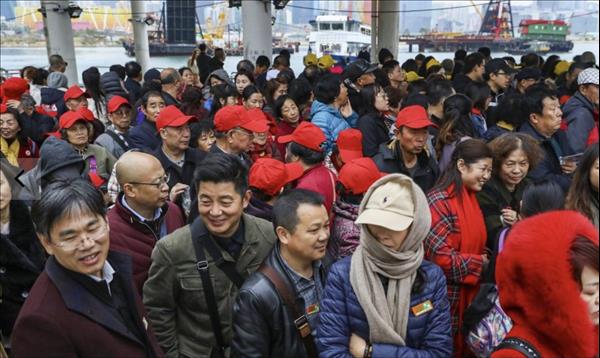(MENAFN- Asia Times) Shops and restaurants in Hong Kong are returning to prime sites and hiring more staff as mainland China is expected to end its hotel quarantine requirements in January.
The Travel Industry Council of Hong Kong expects that the number of tourists visiting Hong Kong will probably increase by 20 to 30% in the coming month.
Currently, China maintains a so-called“5+3” arrangement, which requires incoming travelers to quarantine at designated hotels for five days and stay home for another three days. Many Chinese are thus reluctant to travel overseas.
Although mainland China might shift to“0+3” on January 9, the number of people visiting Hong Kong would only return to 70% of the pre-pandemic level by the end of next year as the city's flight routes were seriously disrupted, some academics project.
Hong Kong has been waiting for almost three years for the so-called“border reopening” with mainland China since the world's first epidemic wave broke out in Wuhan, Hubei in January 2020. Neighboring Macau resumed quarantine-free travel with mainland China in the summer of 2020 as it successfully implemented Beijing's“zero-Covid” policy.
On December 16, the Macau government changed its“5+3” arrangement to“0+5” for all incoming visitors. People can now enter mainland China without quarantine on the ninth day after they arrive in the gaming city.
Tam Yiu-chung, the sole Hong Kong representative in the standing committee of the National People's Congress, said Wednesday the Hong Kong-mainland border would hopefully reopen soon. Tam said he knew that both the Hong Kong and mainland governments were actively preparing to ensure a smooth reopening transition.
Chief Executive John Lee said he would voice Hong Kong people's wishes about the border reopening during his meetings with Chinese leaders in Beijing on Thursday and Friday.
Since Beijing announced on December 7 a 10-point notice that Covid patients could choose to quarantine at home while cities should avoid lockdowns and reduce PCR tests, the number of people with fever in key cities has surged. But rising Covid cases have not yet slowed China's plan to reopen to the world.
Citing different sources, Chinese media said the border reopening would likely start on January 9, initially in Guangdong and Fujian provinces. But, in fact, Zhangzhou in Fujian has already implemented“2+3” policy from Monday and will further ease the requirement to“0+3” on January 9, according to the state-owned Minnan Daily. Shenzhen in Guangdong has unofficially started a“5+0” policy.
Other media reports said both the Hong Kong and Guangdong governments had deployed more customs officers at their borders while the Guangdong-Shenzhen-Hong Kong Express Rail Link would resume services in January.
Gianna Hsu Wong Mei-lun, chairwoman of the Travel Industry Council, said Hong Kong's tourism sector would rebound robustly on the border reopening as Chinese tourists had represented 80% of its 60 million incoming visitors in the past.
However, she said significant growth would only be seen in the second quarter of 2023 as it will take time for airlines to resume regular flights.
Simon Lee, a senior lecturer of the School of Accountancy and co-director of the International Business and Chinese Enterprise program at the CUHK Business School, said it would likely take one or two years for Hong Kong's tourism sector to fully recover as many of its flight routes had been terminated during the pandemic.
He said international tourists remained hesitant to visit Hong Kong as the city had not yet canceled all of its Covid social distancing rules.
On Tuesday, 22,099 people departed Hong Kong while 19,508 arrived in the city via flights, according to the Immigration Department. About 90% of them were Hong Kong residents. Several thousand people traveled to mainland China, the immigration data shows.
In 2018, the number of travelers to and from Hong Kong hit a high of 314 million, or 860,000 per day.
Lau Oi-kwok, vice chairman of the Hong Kong General Chamber of Pharmacy, said many pharmacy shop owners planned to reopen their stores in Wan Chai and Mong Kok where Chinese tourists like to visit and buy medicines.
Lau said shop owners now enjoy low rents, which have fallen by more than 50% over the past few years.
David Leung, chairman of the Hong Kong Guesthouse Association, said some operators had recently renovated their guesthouses and recruited new staff in anticipation of the border reopening.
Simon Wong, president of the Hong Kong Federation of Restaurants and Related Trades, said Hong Kong's restaurants had recently acquired more food for the peak season in the Lunar New Year holidays in late January. However, Wong said they would closely monitor the epidemic situation in Guangdong, which could affect the border reopening plan.
read: china's covid outbreak could kill a million: study
Follow Jeff Pao on Twitter at @jeffpao3

















Comments
No comment